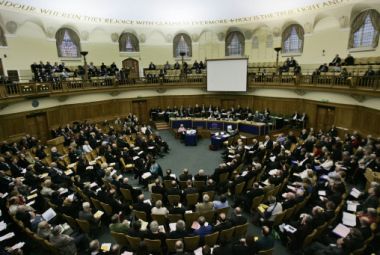Women bishops legislation dominates Church of England General Synod

The Church of England General Synod gets underway today and the main focus of business will be drafts to legislation allowing women to be bishops.
There were tears when the legislation fell at the November 2012 Synod but since then, bishops and church officials have worked hard to put together arrangements that will gain support across the board.
Traditionalists have also been in talks to reach a compromise deal they can accept.
As ever, there is more than one issue for the Synod to discuss, and the debate will kick-start with a presentation by the Ethical Investment Advisory Group by the chair, James Featherby, and the Reverend Professor Burbidge.
It will announce the progress the EIAG is making on reflecting the Church's position on alcohol more faithfully in the area of the Church's investments, and supporting purposeful investment in business. It will introduce the issues EIAG is currently struggling with, from the use of pooled funds in ethical investments to an ethical investment approach to climate change.
The debate will follow with a discussion on gender-based violence, led by Philip Fletcher, Chair of the Mission and Public Affairs Council. This is a key issue facing all societies, including churches, and one which crosses boundaries of culture, geography, faith and wealth.
UN Women revealed that according to a 2014 global review of the available data, 35% of women worldwide have experienced physical partner or non-partner violence, and that up to 70% of women have experienced physical or sexual violence in their lifetime from an intimate partner.
The motion being considered at Synod will seek to encourage boys and men to stand against gender-based violence, which campaigners say is vital to changing attitudes and behaviour.
Tuesday is the day in which the eyes of the world will be focusing on the Synod as the subject of women bishops has caused huge embarrassment for the Synod in the past year, and what has remained difficult to solve is how to accommodate those who disagree. The main item of business will be the Revision Stage for the draft legislation to enable women to become bishops. In an unusual move, this debate will be taken on the floor of the Synod without a prior Revision Committee taking place beforehand.
The sequence of business in relation to women in the episcopate starts with a debate on a motion from the House of Bishops inviting the Synod to welcome the draft House of Bishops' Draft Declaration and Disputes Resolution Regulations.
Synod will give consideration to a draft act of Synod to rescind the Act of Synod 1993, and to a proposal to speed up the passage of the final stages of the women in the episcopate legislation.
If supporters of women bishops win the day, there could be a final vote on the legislation at the summer meeting of the Synod in York.
Wednesday will start with a presidential address by the Archbishop of Canterbury, and a motion will be debated on the drafting of new legislation aimed at improving safeguarding.
A package of proposals for legislative change has been prepared and approved by the Council and the House of Bishops. The intention is to introduce legislation in July, but given the importance and range of the proposals, this report gives Synod the opportunity to consider the package before the preparation of the legislation.
The last debate taking place on Wednesday will focus on the issue of the Girl Guides' promise. A nationwide consultation on the promise was carried out by Girlguiding, asking 44,000 members for their opinions on each line of the promise, including the promise to "love my God", and offering a number of alternative wordings. Following the consultation, the words "to be true to myself and develop my beliefs" replaced "to love my God", and the words "to serve the Queen and my community" replaced "to serve the Queen and my country".
Synod member Alison Ruoff is putting forward the private member's motion that "this Synod believes that girls of all ages in the Girlguiding Movement should not suffer discrimination but be able to continue to promise to love God when enrolled rather than making a wholly secular promise". Her motion received 131 signatures.











